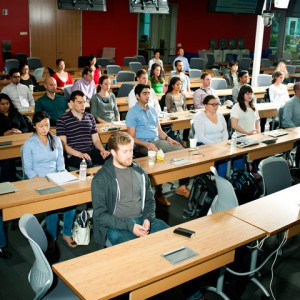Today we take a look at something a little bit different, courtesy of Caroline.
What is the common point between Steve Jobs, Evan Williams, Larry Brilliant and Richard Branson? Yes, they are CEOs and talented people, but is there anything else? All of them, as it turns out, use meditation as a tool for success. It’s too easy to dismiss it as a fad, but mental health is an important issue.
While the world is becoming more connected, a lot of people are experiencing a paradox, feeling more mentally disconnected from others and themselves. With this situation, relaxation techniques and practices are re-emerging – with meditation at the forefront.
The practice has gained popularity in the corporate world, and apparently with good reason – every other week there seems to be a new scientific study showing just how it can change the brain. Apple allows its employees to take 30 minutes each day to meditate at work, and Google has appointed a head of personal growth. Similarly, Intel, Nike, HBO, AOL Time Warner, P&G and others are already exploring the idea, and the list is growing fast.
“Instead of having their brilliance diluted across multiple projects all the time, they can bring all of their brilliance into laser-like focus, go deep and apply that into one project.”
Lindsay Van Driel – Platform Strategist at Intel’s Software and Services Group and co-founder of Awake@Intel
Silicon Valley has historic roots with San Francisco’s hippie culture, which sometimes feels at odds with it being an innovation hub for the world. But it actually makes a lot of sense – to push yourself mentally to create and innovate, but trying not to burn out and lose what makes us human. Today, the Valley appears to be leading the way, focused on the brain-training aspects of the practice much like samurai in ancient times, reshaping Eastern traditions to fit its goal-oriented and data-driven culture.
Case in point, Facebook and Twitter have also made meditation a key feature, allowing regular in-office meditation sessions and work schedules to create more mindfulness. And more than 1,700 people attended the Wisdom 2.0 conference, the first international conference on tech and wellbeing held in San Francisco last February, including top executives from LinkedIn, Google and Instagram, coaches, yoga teachers and even Buddhist monks.
Most people love the idea of mindfulness and meditation, but claim that they do not have the time to do it. Which is funny when you think about how much time we collectively spend on social networks, or watching videos. You can make five minutes to update the ‘world’ on what you ate, but you can’t dedicate time to your own mental health?
Meditation at work still makes some people laugh, especially because it conjures images of people sitting in the lotus position, and is still perceived as a religious practice. There’s no tangible science behind it which can be used to support its benefits. And this is precisely the problem tech is currently solving – with great success. One example is a guided meditation and mindfulness music app, Headspace, which offers a “gym membership of the mind”. Headspace raised over $30 million in funding, and claims to be used by upward of 3 million people.
In addition to improving your health to get you started: it is now recognised that meditation can help you with many situations at work, such as:
- Making decisions more serenely with the ability to help employees clear their minds, maintain a state of calm, and focus on the present moment
- Increasing emotional intelligence and being more in tune with our own emotions and those of others
- Enhancing employees focus abilities and our attention to details
- Sharpening memory
- Handling stress and unexpected situations calmly, and stepping out of negative thoughts
- Reducing tensions in the workplace
Now that apps have made meditation so accessible, it is even easier than ever to start focussing on the present moment, and letting go of corporate stresses. No more excuses.


